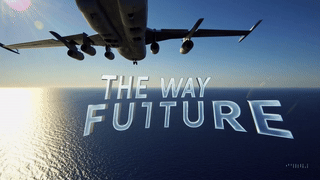The Aviator unfolds with Jack Frye, Howard Hughes’ business associate, urgently lobbying French and British ambassadors to grant TWA international air rights. It soon becomes clear that the villainous Pan Am sought to dominate international travel through a nefarious monopoly sanctioned by the Community Airlines Bill.
Howard Hughes, however, wasn’t one to bow to such power plays. He waged a ruthless counteroffensive—bribing senators, funneling funds through shadowy SuperPACs, and deploying private investigators to spy on rivals. It was a high-stakes game, and Howard played it grimly well.
Behind his outward bravado, Howard grappled with a tormented psyche. When work overwhelmed him, he’d vanish briefly, pouring over blueprints obsessively until anxiety consumed him. His refuge was often his car, where he suffered severe panic attacks, compulsively spelling words like “quarantine” in desperate attempts to regain control.

The way of the future.
Howard’s troubles were compounded by relentless FBI harassment, backed by a federal warrant. Agents invaded his private spaces, touching his belongings in a calculated psychological assault meant to break his resolve.
The rivalry with Senator Brewster was fundamental—both men had starkly opposing views on international travel. Brewster favored a monopolistic control by a single airline, whereas Hughes saw this as dangerous and inherently corrupt. Howard’s crippling agoraphobia complicated matters, making public appearances torturous ordeals. Juan Trippe offered Howard a cruel mercy: sell TWA to him, and the senate hearings would vanish. Howard refused, despite his suffering.
Hughes’ private agony was further deepened by his personal relationships. He coldly rejected Kate Hepburn during the crisis when she attempted reconciliation, forever severing their bond at a time when his life was spiraling into darkness.
A striking revelation was TWA’s inherent value. Its domestic routes were astonishingly worth twice as much as Pan Am’s, irrespective of Pan Am’s inflated stock prices. Juan Trippe’s plan was straightforward and vicious—public humiliation. He aimed to destroy Hughes by exposing the salacious wartime film “The Outlaw” Hughes produced while American soldiers were dying abroad, alongside highlighting costly military contract failures, specifically the infamous Hercules aircraft.
The Brewster hearings were little more than a weaponized spectacle orchestrated by Trippe, who saw himself as divinely entitled to rule international air travel. Senator Brewster feigned moral outrage over supposed bribes arranged by Hughes’ press agent, John Myer. Indeed, entertaining military officials with prostitutes was common practice at the time—immoral, perhaps, but hardly illegal.
Hughes fiercely defended himself, turning the spotlight back onto Trippe’s hypocrisy. If Juan was truly a great patriot, Howard wondered publicly, why wasn’t he enriching his own shareholders? Furthermore, Hughes addressed the disastrous waste of over six billion taxpayer dollars on undelivered military aircraft, highlighting that companies like Lockheed Martin escaped accountability while Hughes Aircraft unfairly bore the blame.
Ultimately, Howard Hughes emerged victorious. The senate hearings collapsed, the airline bill was struck down, and Howard secured TWA’s international presence, crushing Juan Trippe’s dreams of monopoly.
In a haunting irony, Howard, battered yet triumphant, spoke prophetically to reporters: “Technologies like these are the way of the future…the way of the future.”